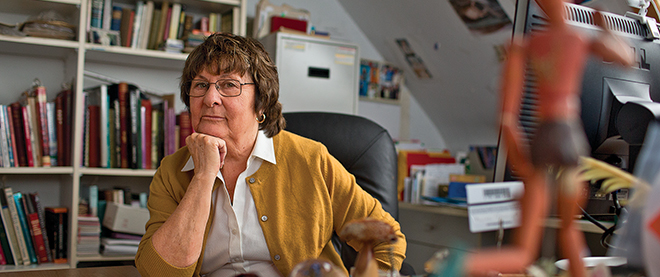The war at home
The Canadian front has its day, thanks to the author behind Murdoch Mysteries
Photograph by Jennifer Roberts
Share

Maureen Jennings, as detail obsessed a bestselling crime writer as Canada has to offer, is fascinated by her latest experiment. “Do you know the Imperial War Museum in London?” she asks animatedly. “You can go on their website and order a week’s supply of wartime rations. I didn’t go for the two ounces of butter—it would have gone rancid on the way to Toronto—but the others have just arrived: a tiny jar of jam; a little chocolate; a tiny, tiny, packet of tea. Really, there’s only a day’s worth for a serious drinker.” It’s a good thing, Jennings adds with a laugh, that at age 73 she no longer drinks tea. “Living for a week on the rest will be hard enough.”
That sort of thing has always been grist to Jennings’ authorial mill, which has—in unheard-of fashion for a Canadian writer—inspired two concurrent TV series, Murdoch Mysteries and Bomb Girls. For the sake of her new Second World War home-front trilogy, Season of Darkness, featuring Det. Insp.Tom Tyler of the small English town of Whitchurch, she wants to know what it was really like to have been there when the bombs were falling.
Not that she wasn’t. Born in the industrial centre and prime Luftwaffe target of Birmingham just weeks before the war began in September 1939, Jennings lived right through it. She remembers as a child does, however: impressions of a life that was neither good nor bad, but simply accepted as the way things were. Sometimes the sirens screamed, and when you emerged from the shelter a nearby block was a smoking ruin. Sometimes people died, like her father, killed in action in Italy in 1943. “I thought I knew all about the war at home,” says Jennings, who emigrated to Canada with her mother in 1956. “But I didn’t really. I’m still learning.”
The research has been a labour of love, even more than the work that went into crafting the fictional Victorian Toronto of Jennings’ first, and still ongoing, series of crime novels featuring Det. William Murdoch. “When I came to Toronto in 1961, before the building boom, the city was still so Victorian-looking, so reminiscent of Birmingham,” Jennings says. When she began to write in the mid-1990s, after careers as an English instructor at Ryerson and private practice as a psychotherapist, she found it easy to ground Murdoch—exactly a century before—in the same streetscapes she recalled as a newcomer. Her fish-out-of-water detective—a progressive-thinking Roman Catholic in a stubbornly conservative Protestant burg—has flourished ever since, through seven novels and, since 2006, six TV seasons.
Bomb Girls had its genesis when, on set at Murdoch Mysteries, producer Debi Drennan asked Jennings what she was then working on. “When I mentioned the Tyler trilogy, her eyes lit up,” says the author. “Turns out she’d being trying for years to get something going based on this huge wartime armaments factory in [the Toronto suburb of] Scarborough.” Their concept came to air a year ago, first as a six-part mini-series, but now as an ongoing drama. Both it and Murdoch are hugely popular with viewers and critics. Between them they have nine nominations for the Canadian Screen Awards (the former Geminis and Genies) that will be handed out on March 3.
Jennings doesn’t know why the home front is suddenly having its day in the sun, though she’s very happy to see it. “I had always wanted to set a novel then, but it never seemed the right time, that there was the right amount of interest. The war focus was always on the men and the battles and the landings. This is a way of saying, ‘Hey, women were doing dangerous work too.’ ” She is planning to write an episode for Bomb Girls’ second season.
Jennings’ future also includes the (perhaps) final book about Tom Tyler, now that Season of Darkness (the trilogy and its first novel have the same title) and Beware This Boy have been published. That means more hours immersed in the “mind-bogglingly fascinating” files amassed by Mass Observation, the wartime association of volunteer eavesdroppers recruited by the British government to monitor civilian morale. But first, there’s that little dietary experiment to get through.